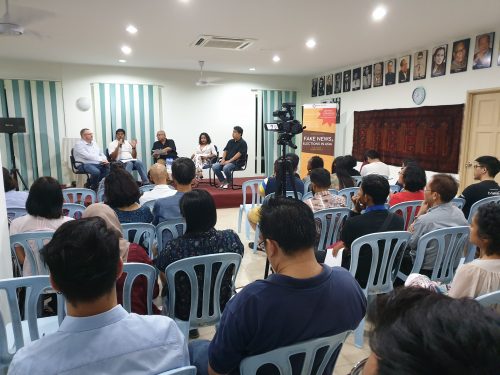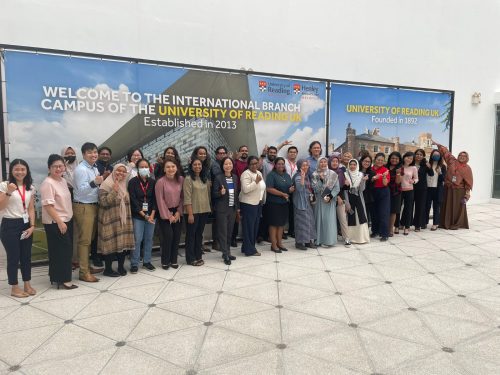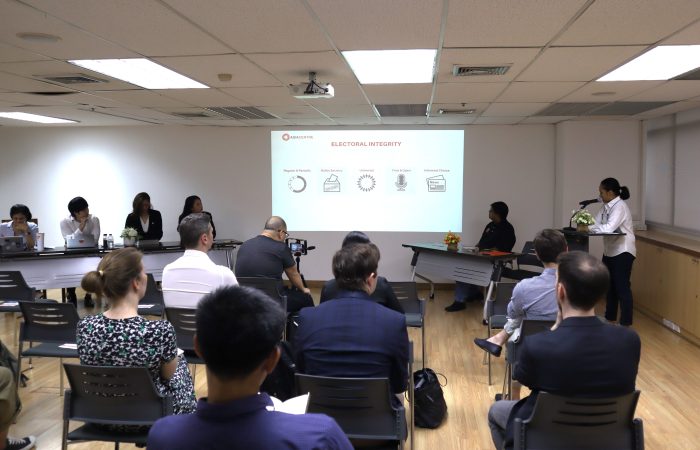
On 28 April 2023, Asia Centre held a discussion panel for the launch of its latest report “State-Sponsored Online Disinformation: Impact on Election Integrity in Thailand”. The discussion panel assesses how state-sponsored disinformation or Information Operations (IOs) impact Thailand’s electoral integrity.
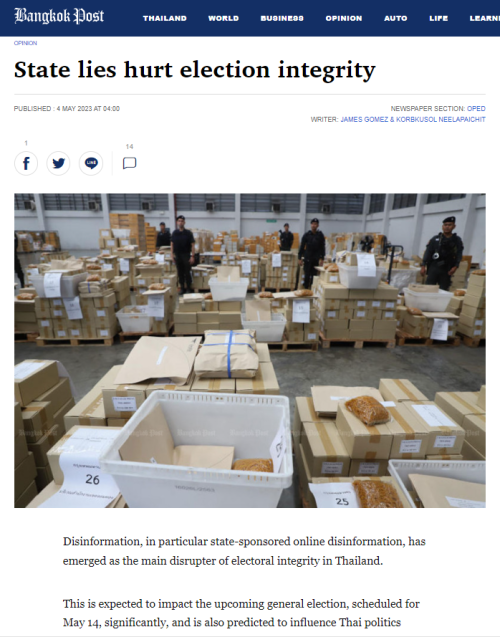
A week after releasing, Bangkok Post, an English-language daily newspaper, published an opinion piece, State Lies Hurt Election Integrity written by Dr James Gomez and Korbkusol Neelapaichit. Besides, the key research findings were also promoted via an online campaign with infographics posted on Asia Centre’s social media platforms, Facebook, Linkedin, Instagram, and Tiktok.
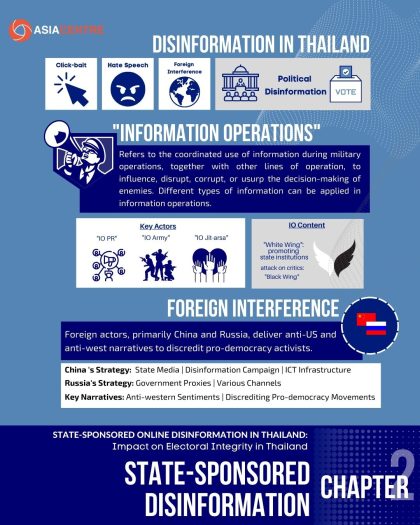
The event, at the Centre’s Meeting Hub, was attended by representatives from diplomatic services, civil society organisations, human rights activists, lawyers, journalists and those from the tech sector.
Korbkusol Neelapaichit, Researcher, Asia Centre who led the research for the report, highlighted four key impacts of state-sponsored disinformation on Thailand’s electoral integrity.
First, using state resources to promote a positive image of the establishment undermines the integrity of elections since the government uses its incumbent advantage over opposition parties for positive electoral messaging. Second, IOs are weaponised to harass politicians and activists from marginalised groups such as women, LGBT+ and ethno-religious minorities, obstructing their meaningful electoral participation. Third, they distort information related to the electoral process and discredit selected political parties and their policies, depriving voters of verified alternative information for their decision-making. Fourth, state-sponsored disinformation stir hatred and exacerbate existing ideological divisions within society leading to extreme political polarisation.
Moderated by Asia Centre’s Dr James Gomez, the findings were further discussed by Kunthika Nutcharut, Attorney from Krisadang Law and Accounting Office, Dr. Sipim Sornbanlang, Lecturer from Srinakharinwirot University, Akarachai Chaimaneekarakate, Legal Fellow from Thai Lawyers for Human Rights (TLHR) and Pornpen Khongkachonkiet, Director of Cross-Cultural Foundation.
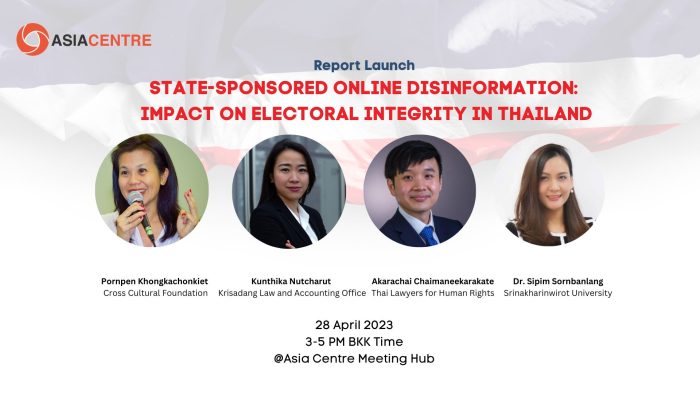
Kunthika Nutcharut pointed out how disinformation campaigns have been sponsored by the state from time to time to stir hatred in society. In the past, disinformation campaigns were disseminated via state-owned radio stations. Today, IOs are carried out online especially to attack human rights defenders and political activists.
From a cyber security perspective, Dr. Sipim Sornbanlang provided insight into why the state sponsors IOs. She explained that the state agencies, especially the military, run IOs as part of their mission to protect the monarchy and state institutions. This stems from a perception that democratisation threatens national security.
In line with the report findings, Akarachai Chaimaneekarakate described that IOs are strategised to attack both individuals and organisations. He validated his statement by sharing several legal cases, where there was evidence of state-supported information operations. However, he noted, there is no attempt to hold the state to account.
Using examples from Thailand’s South where there is ongoing ethno-religious conflict, Pornpen Khongkachonkiet explained that IOs form part of state suppression of expression in the South. Such actions, she said, curtail meaningful political participation.
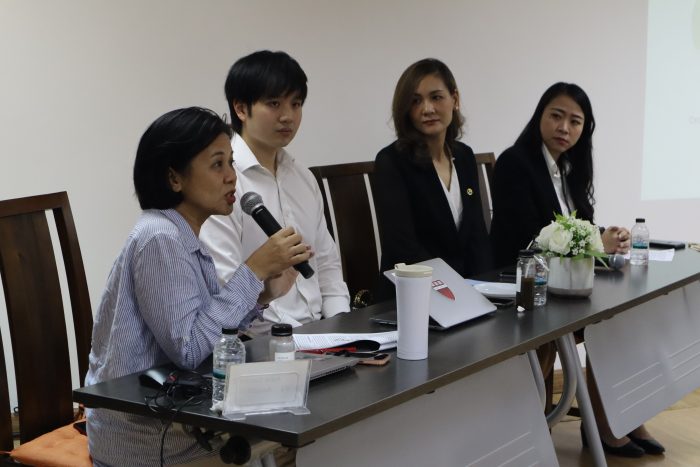
In the report, Asia Centre recommends relevant stakeholders take the following key actions: restrain from undertaking information operations; identify state agencies and report the type and targets of information operations; focus on providing voters with reliable and verified electoral information; and take measures to ensure electoral integrity through free and fair elections. These and other measures will help cast a light on state-sanctioned information operations with a view to addressing their impact on election integrity and political participation.
Read the full report here. You can also watch the TikTok video of the report launch event here.
This report is Asia Centre’s third baseline study on Thailand. In June 2022, the Centre released its first report entitled Thailand Computer Crime Act: Restricting Digital Rights, Silencing Online Critics which reviews the provisions of the 2007 Computer Crime Act (CCA) and its 2017 amendment, as well as their impact on digital rights in Thailand. Later in August 2022, the Centre released its second report on Internet Freedoms in Thailand which reviews and analyses legislation that impacts internet freedoms in Thailand.
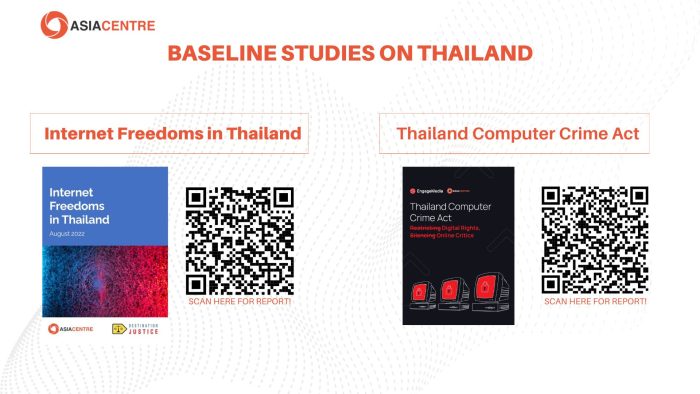
Asia Centre is a civil society research institute in Special Consultative Status with the United Nations Economic and Social Council. It serves as a knowledge partner and undertakes evidence-based research as well as provides capacity-building training for end beneficiaries. If you would like to collaborate with the Centre, please send an expression of interest to contact@asiacentre.org.

